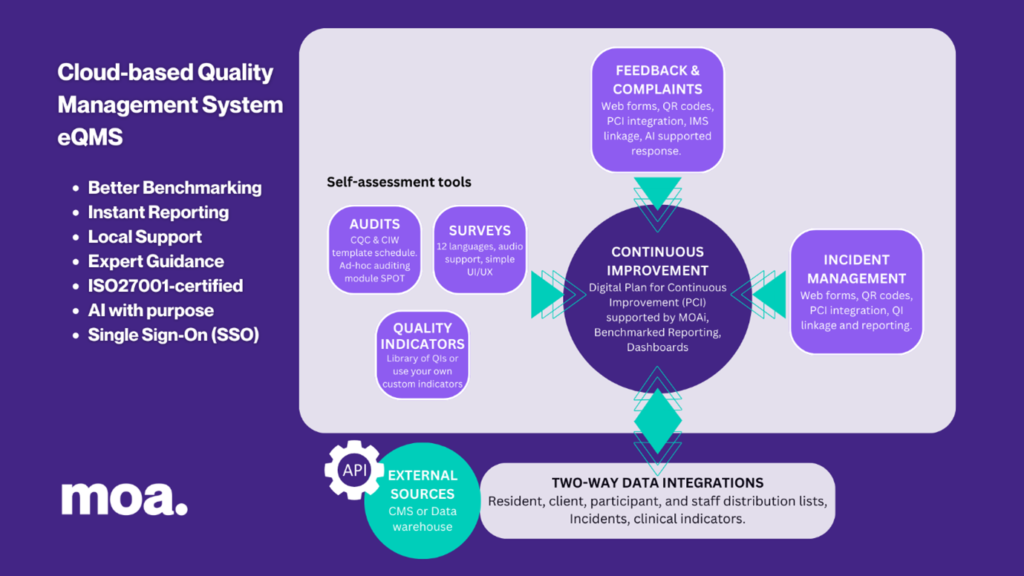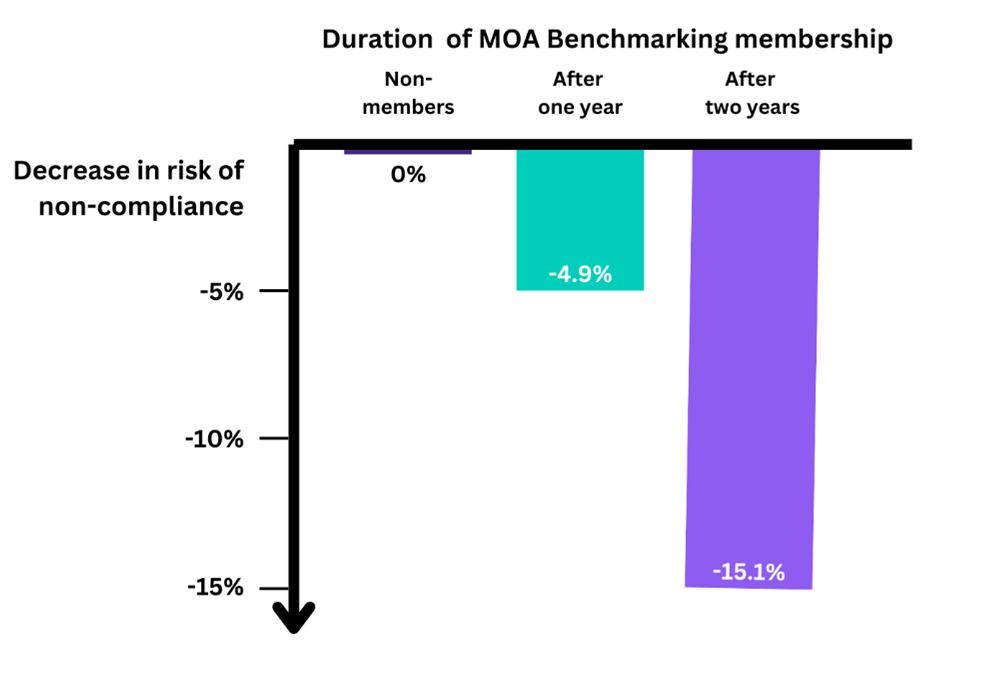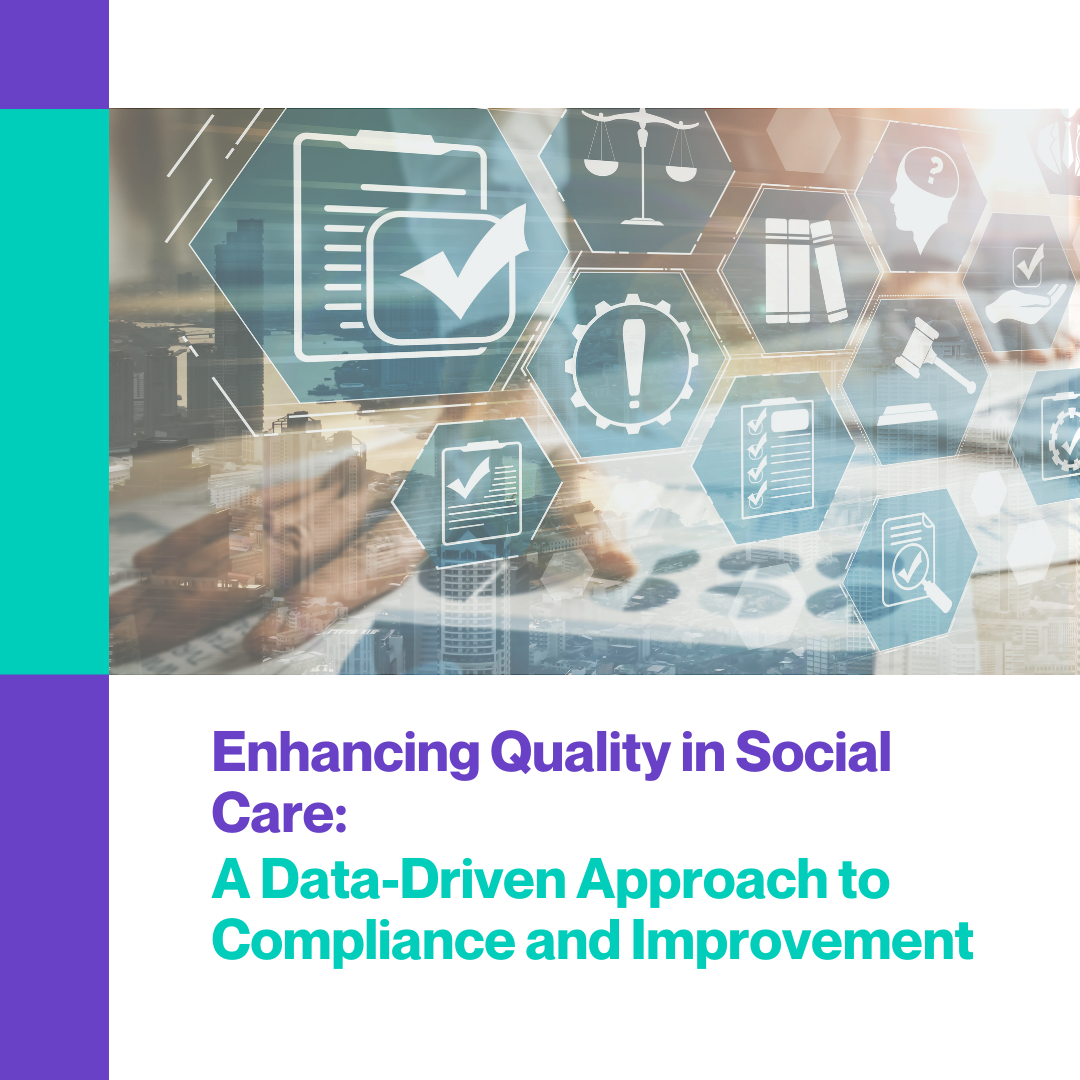Executive Summary
Social care providers in England face significant challenges in maintaining high-quality services while navigating complex regulatory requirements and evolving community expectations. The sector must address issues such as compliance with Care Quality Commission (CQC) standards, managing diverse care needs, and effectively utilising data to drive continuous improvement. Many providers struggle with fragmented data systems, limited feedback integration, and the capacity to sustain long-term quality improvement initiatives.
This white paper explores these challenges and examines the role of integrated quality improvement solutions in supporting care providers to meet regulatory and operational demands. A key focus is the need for a structured, research-informed approach to quality management that facilitates ongoing compliance, enhances care delivery, and fosters a culture of continuous improvement.
Through the implementation of comprehensive quality management platforms, providers can streamline evidence collection, analyse performance data, and take proactive steps to enhance service quality. The inclusion of tools such as audits, quality indicators, surveys, and feedback mechanisms within a single system allows for a more efficient and holistic approach to quality improvement.
The white paper presents a case study from Trustmark Care, demonstrating how an integrated quality management system supported their organisation in addressing operational challenges and improving compliance outcomes. Additionally, international evidence highlights the tangible benefits of sustained engagement with structured quality improvement frameworks. Analysis of providers using a similar platform found that continued use was associated with a 15% reduction in the risk of regulatory non-compliance, and long-term users achieved higher quality ratings compared to non-users.
As the social care landscape continues to evolve, adopting an integrated, data-driven approach to quality improvement is essential for providers to remain compliant, responsive, and capable of delivering high standards of care. This white paper aims to inform decision-makers about the potential benefits of structured quality improvement systems and their role in enhancing care delivery across England’s social care sector.
Problem Statement: Challenges in Quality Improvement for Social Care
Social care providers in England face a demanding operational environment that requires them to meet extensive regulatory requirements while also responding to client needs and evolving community expectations. The challenges are multifaceted, spanning operational, technical, and strategic domains, these include:
- Regulatory Compliance and Community Expectations
Providers must navigate a web of ever-changing regulations, including the Care Quality Commission’s (CQC) requirements, while simultaneously meeting the expectations of residents, families, and other stakeholders. This creates pressure to demonstrate both compliance and excellence in care delivery. - Diverse Care Needs
Delivering high-quality care to a diverse cohort of residents with varying needs—including cultural, linguistic, and health-related complexities—demands tailored approaches and scalable systems that many providers find difficult to implement. - Difficulty Converting Data into Actionable Insights
While audits and surveys are critical for identifying areas for improvement, care providers often struggle to translate the findings into actionable insights. Existing tools rarely offer a structured, research-backed framework, leaving providers to create and refine their own resources, a process that consumes valuable time and expertise. - Fragmented and Inefficient Data Management
Evidence of compliance and quality improvements is often stored across disparate systems, including outdated paper-based records. This fragmentation not only hampers efficiency but also complicates the ability to present clear, consolidated evidence during inspections or reviews. - Limitations of Current Feedback & Complaint Mechanisms
Many feedback systems lack integration with Continuous Quality Improvement (CQI) planning. This disconnect prevents valuable input from residents, families, and staff from driving meaningful and systematic changes in care quality. - Capacity and Capability Challenges
The sector struggles with building capacity and capability for sustained improvement. Research highlights the need for a comprehensive approach to embed quality improvement into routine practice, yet many organisations lack the tools and resources to achieve this effectively.
These challenges highlight the pressing need for an integrated, research-informed solution. One that not only streamlines compliance but also empowers providers and their teams to deliver consistently high-quality care.
Example: Converting Data into Actionable Insights
Scenario:
A medium-sized care home conducted a staff satisfaction survey and an assessment of its fall rate. The results highlighted several key areas needing attention:
- 65% of staff reported challenges with communication during shift changes.
- The assessment revealed that falls were more frequent during late evening shifts.
Challenge:
Despite identifying these issues, the care home struggled to connect the findings to specific, actionable improvements. The survey data and indicator results were stored in separate systems, with no centralised platform to connect the information. Furthermore, auditing tools used to assess practices were generic and lacked tailored recommendations for fall prevention in care settings.
Outcome:
Without a clear framework or integration:
- The leadership team spent several weeks manually consolidating and interpreting the data, delaying response efforts.
- Staff engagement dipped further as the care home failed to act swiftly on feedback.
- The fall prevention strategies implemented were generic and didn’t address the care home context.
Comprehensive Tools Tailored to English Social Care Providers
MOA Benchmarking is a cloud-based Quality Management System (eQMS) developed to address the complex quality improvement and compliance needs of the social care sector. Built on a foundation of research and sector expertise, the platform integrates tools for audits, quality indicators, surveys, feedback and incident management into a cohesive framework. Its design reflects the operational and regulatory realities faced by care providers, enabling them to streamline processes, enhance care quality, and foster a culture of continuous improvement.
By providing structured, evidence-based solutions, MOA Benchmarking supports providers in managing the demands of a diverse care environment, meeting regulatory requirements, and improving outcomes for residents and service users. With an emphasis on integration, actionable insights, and sector-specific content, the platform enables providers to focus on delivering high-quality care.

Figure 1 The MOA Benchmarking integrated electronic Quality Management System (eQMS)
1. Comprehensive Audit Content
Unlike some audit platforms that only host user-uploaded audits or offer generic templates, MOA Benchmarking provides a comprehensive annual schedule of well-researched audits, which are:
- Specifically designed to fully address Care Quality Commission (CQC) requirements, ensuring compliance across all key areas.
- Tailored to the unique challenges of English social care providers, incorporating international best practices and industry insights.
- Continuously updated to remain relevant to the evolving regulatory landscape.
By eliminating the need for care providers to design and build their own tools, MOA Benchmarking empowers organisations to focus on delivering high-quality care rather than maintaining self-assessment tools and compiling evidence from disparate sources.
2. Customised Tools for Evidence Collection
MOA Benchmarking ensures that self-assessment tools, including audits, quality indicators (QIs), and surveys, are scheduled at intervals that align with regulatory and operational requirements:
- Quality Indicators are collected monthly, providing timely insights into key metrics including clinical and operational outcomes.
Audits are scheduled to provide regular, structured opportunities to assess and improve care quality over a 12-month schedule. This proactive scheduling ensures care providers consistently collect evidence, enabling them to demonstrate ongoing compliance and improvement.
- Surveys are designed to capture client, staff and relative or representative views and experience of the services you provide. Client surveys are available in 12 different languages, and audio support is available to those with vision impairments. This approach helps to ensure that everyone’s voice is heard.
Proactively self-assessing through MOA’s tools can help to embed a strong culture of quality within the organisation. By making self-assessment routine, providers foster accountability, continuous learning, and a shared commitment to excellence among staff.
3. Data Integration with continuous improvement planning
At the heart of MOA Benchmarking’s platform is the Digital Continuous Improvement Plan (CIP), which centralises insights from all tools into a cohesive quality improvement framework.
- Audit Findings, QIs, and survey data automatically feed into the PCI, transforming raw data into prioritised, actionable tasks.
- Incident reports and feedback submissions are also linked to the PCI, ensuring that safety concerns and stakeholder input directly inform improvement plans.
- Improvement activities are supported by enterprise-level Artificial Intelligence trained to assist staff in developing evidence-based actions.
This integration streamlines workflows, enabling providers to act swiftly on insights, track progress, and align efforts across the organisation.
4. Research-Driven and Relevant Content
MOA Benchmarking’s content is developed by a team of qualified experts, ensuring it goes far beyond the offerings of other software platforms:
- Depth and Specificity: Every audit and quality indicator is designed to comprehensively address Care Quality Commission (CQC) standards, focusing on critical areas such as resident safety, clinical governance, and care outcomes. This level of precision enables care providers to confidently meet regulatory expectations and deliver exceptional care.
- Expert-Led Development: The design of MOA’s tools are overseen by leading professionals:
- Lahn Straney, an Associate Professor and epidemiologist, designs the reporting framework and supports members in interrogating data to answer questions critical to their quality improvement journey.
- Dr. Leith Heyman, a researcher and medical anthropologist, leads MOA’s content team, ensuring every tool is grounded in rigorous research and practical relevance.
- Customisation for Social Care: The platform reflects the specific operational and regulatory challenges faced by English social care providers, delivering tools that are tailored to the realities of the sector.
- Organisation-Specific Customisation: The full schedule of audits and surveys can be configured and customised to match a provider’s specific model of care and organisational requirements and preferences.
- Continuous Updates: MOA’s tools are regularly updated to stay aligned with the evolving regulatory landscape, ensuring care providers always have access to the most effective and relevant content.
This is not a team of software developers exploiting a new market; it is a group of sector experts with a deep understanding of the unique challenges and needs of social care. This foundation ensures that MOA Benchmarking’s content is not only innovative but also rooted in the practical realities of care delivery.
5. Multi-Tool Integration for Holistic Oversight
MOA’s platform has been developed from the ground up as a seamlessly integrated, end-to-end, quality improvement ecosystem. In addition to the PCI module and self-assessment tools (audits, QIs, and surveys), MOA offers additional integrated modules:
- Incident Management System (IMS) allows users to create, manage and respond to incidents in the service, via integration to your care management system (CMS), integrated public web forms, QR codes, or direct from the MOA platform. Data in the IMS can be linked to the PCI to manage through to resolution.
- Feedback and Complaints Module supports all stakeholders to provide input on the service being provided. Using QR codes, public web forms, and supporting email and in-person feedback – MOA system is designed to support best-practice in feedback handling. Additionally, feedback can be connected to the PCI to support driving meaningful change.
6. Scheduled Reporting and Evidence Presentation
MOA Benchmarking automates the creation of instant reports for inspections, internal reviews, and stakeholder presentations. These reports allow care providers to:
- Demonstrate compliance with CQC requirements.
- Showcase evidence of ongoing quality improvement.
- Improve transparency and efficiency during regulatory and stakeholder engagements.
How MOA Benchmarking Stands Out
- Ease of Use: Pre-written, research-backed audits and automated scheduling reduce administrative burdens.
- Proactive Quality Culture: Regular self-assessments encourage a strong commitment to quality across the organisation and help to embed quality thinking as part of routine practice.
- Depth and Breadth: Comprehensive tools cover all critical areas, ensuring providers meet and exceed CQC standards.
- Fully connected: The CIP can be informed by audits, QIs, surveys, incidents, and feedback creating a unified improvement framework.
- Inclusivity: Multilingual surveys (12 languages) ensure every voice is heard, fostering a culture of inclusivity and transparency.
- Proven Impact: Each tool complements the others, driving measurable improvements in compliance, care quality, and operational efficiency.
Case Study: Trustmark Care’s Experience with MOA Benchmarking
Background
Trustmark Care, a well-established care provider, prioritises maintaining high-quality services for its clients while navigating the complex regulatory landscape. To achieve this, they sought a comprehensive platform that would not only support compliance but also embed continuous improvement into their daily operations.
Challenge
Before adopting MOA Benchmarking, Trustmark Care faced challenges in streamlining their quality improvement processes. They needed a solution that could:
- Regularly assess their services through structured and insightful audits.
- Enable effective action planning to address areas for improvement.
- Provide robust tools for monitoring incidents and gathering stakeholder feedback.
- Offer responsive support to ensure efficient use of the platform.
Solution
Trustmark Care implemented MOA Benchmarking’s integrated platform, which offered:
- Comprehensive audits tailored to social care, providing detailed insights into their service performance.
- Tools for creating actionable improvement plans, ensuring issues identified through audits were systematically addressed.
- Incident reporting and feedback features to capture data on business operations, fostering reflection and improvement.
- Ongoing support from MOA Benchmarking’s team, ensuring a seamless user experience.
Results
Since adopting MOA Benchmarking, Trustmark Care has seen significant benefits:
- Enhanced Confidence: Regular assessments using MOA’s comprehensive audits provide peace of mind and assurance that their services meet regulatory and community expectations.
- Improved Operations: The integration of incident reporting and feedback features has enabled the management team to monitor and reflect on their care processes in a more robust and positive way.
- Proactive Support: The MOA Benchmarking team’s responsiveness and willingness to address requests promptly have enhanced the overall user experience, making the system an indispensable part of their operations.
Testimonial
“MOA Benchmarking has been an invaluable tool for our organisation, providing peace of mind by enabling us to regularly assess our services through comprehensive audits. The platform not only offers detailed insights but also equips us with the tools needed to create effective action plans for continuous improvement.
The recent additions of incident reporting and feedback features have elevated the system even further, allowing us to monitor and reflect on our business operations in a more robust and positive way.
Additionally, the team at MOA Benchmarking are incredibly proactive when it comes to addressing requests and are always readily contactable through a variety of means. Their support ensures a seamless and efficient experience, making them a pleasure to work with.”
– Registered Manager, Trustmark Care
Proven Impact Globally
MOA Benchmarking has become a trusted leader in the care sector, with more than 1,250 care homes and over 1,000 domiciliary social care providers using its platform. This widespread adoption underscores MOA’s reputation as a transformative force in quality improvement, compliance, and operational efficiency.
Improving Care Quality Through Proven Outcomes
MOA Benchmarking’s tools and integrated approach have been shown to drive measurable improvements in care quality and compliance.
“Our analysis of regulatory compliance data shows that sustained use of our platform significantly reduces the risk of non-compliance. Using logistic regression, we found that providers engaging with the platform over time experienced a 15% lower risk of receiving a regulatory non-compliance notice. These results demonstrate the tangible impact of our tools in helping care providers meet regulatory requirements and deliver higher standards of care.”
– Associate Professor Lahn Straney
Statistical analyses of sector-wide data demonstrate that MOA members consistently outperform their peers, showcasing the platform’s long-term impact:
Higher Star Ratings for Quality Measures
- MOA members achieve superior results in national quality rating systems, consistently outperforming non-members.
- Care providers with longer tenure using MOA see the greatest benefits.
- Using a linear regression model, MOA demonstrated that for each year a care home uses the platform, its average quality rating improves significantly.
- After five years, MOA members have, on average, a 12% increase or a 0.4-point higher rating than newly joined members—an achievement that directly reflects enhanced care quality and resident outcomes.
Risk of Non-Compliance
- MOA members are at a lower risk of regulatory non-compliance compared to other residential aged care facilities.
- Data shows a 5% reduction in non-compliance risk after just one year of using the platform.
- By the second year, this figure improves further, with homes demonstrating a 15% lower risk of non-compliance.
- These results highlight how MOA empowers providers to mitigate risks and maintain high standards of care over time.

Figure 2 Evidence based reduction in regulatory non-compliance among care providers using the MOA Benchmarking platform.
Global Lessons for the UK Care Sector
MOA Benchmarking’s track record globally demonstrates its potential applicability within the UK care sector. Evidence indicates that the platform supports improvements in care quality while helping to mitigate operational risks and regulatory pressures. With care providers in England encountering comparable challenges, MOA’s established outcomes suggest it could serve as a valuable tool in fostering excellence across the sector.
Conclusion
The challenges faced by social care providers in England, including complex regulatory The challenges faced by social care providers, including complex regulatory requirements and the need for a robust quality improvement framework, underscore the necessity of a comprehensive, integrated solution. MOA Benchmarking has demonstrated its capacity to address these challenges through proven outcomes, supporting thousands of care providers and consistently delivering measurable improvements in quality and compliance.
By integrating audits, quality indicators, surveys, and feedback mechanisms into a centralised system, MOA Benchmarking enables care providers to streamline data management, foster a culture of continuous improvement, and help providers make decisions that enhance care quality. The platform’s research-driven tools, expert-led development, and seamless integration position it as an effective partner for organisations striving to meet the evolving demands of social care.
Providers looking to embed proactive quality governance into their operations can benefit from MOA Benchmarking’s structured, evidence-based approach. By investing in a system that consolidates data, identifies actionable insights, and drives meaningful change, organisations can not only meet regulatory expectations but also deliver better outcomes for residents and their families.
To explore how MOA Benchmarking can support your organisation in achieving these goals, consider engaging with the platform to experience its tools and benefits firsthand. Proactive steps taken today can ensure a foundation of excellence for the future of care.
Contact Details
Grant Lewis, [email protected]

